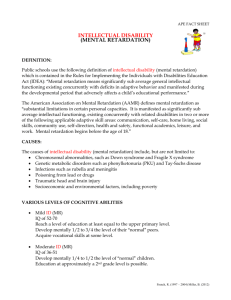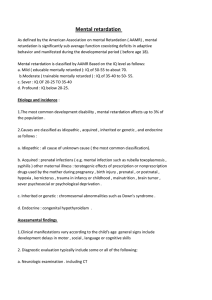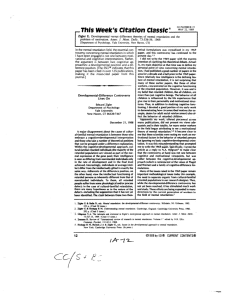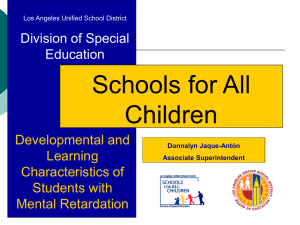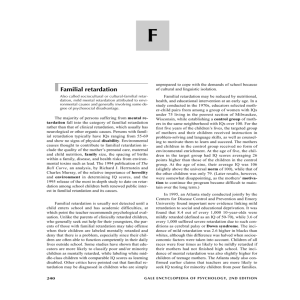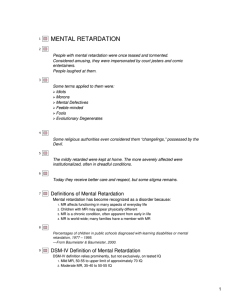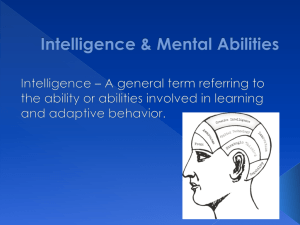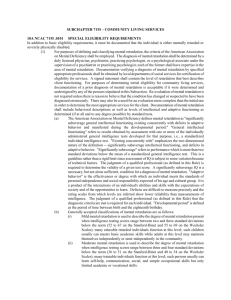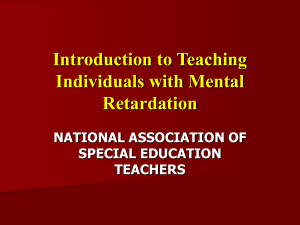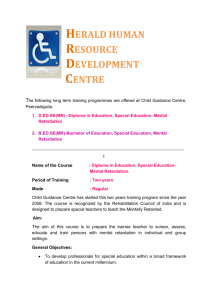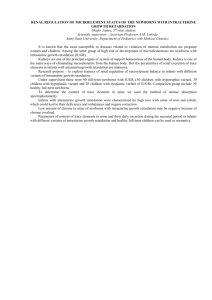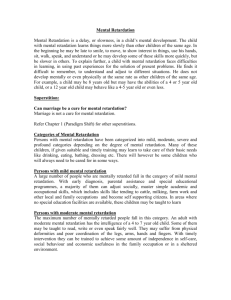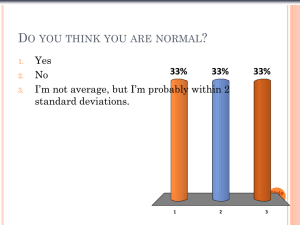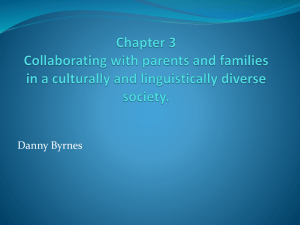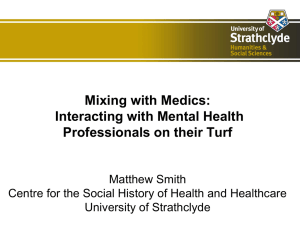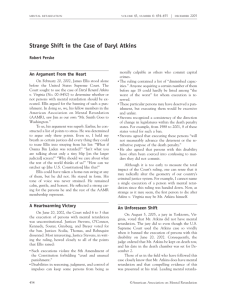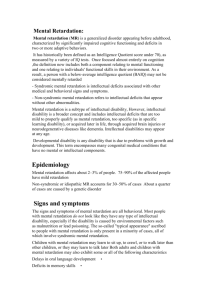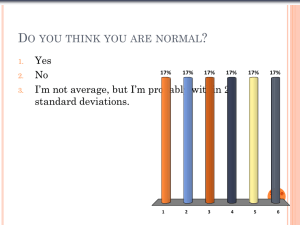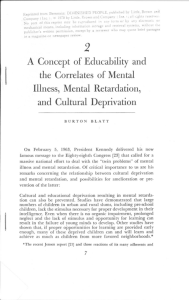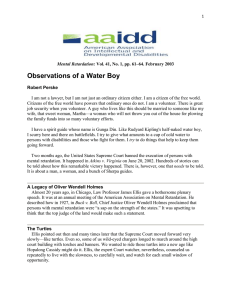Budovich Tatsiana Budovich Professor Lori Sozio Introduction to
advertisement
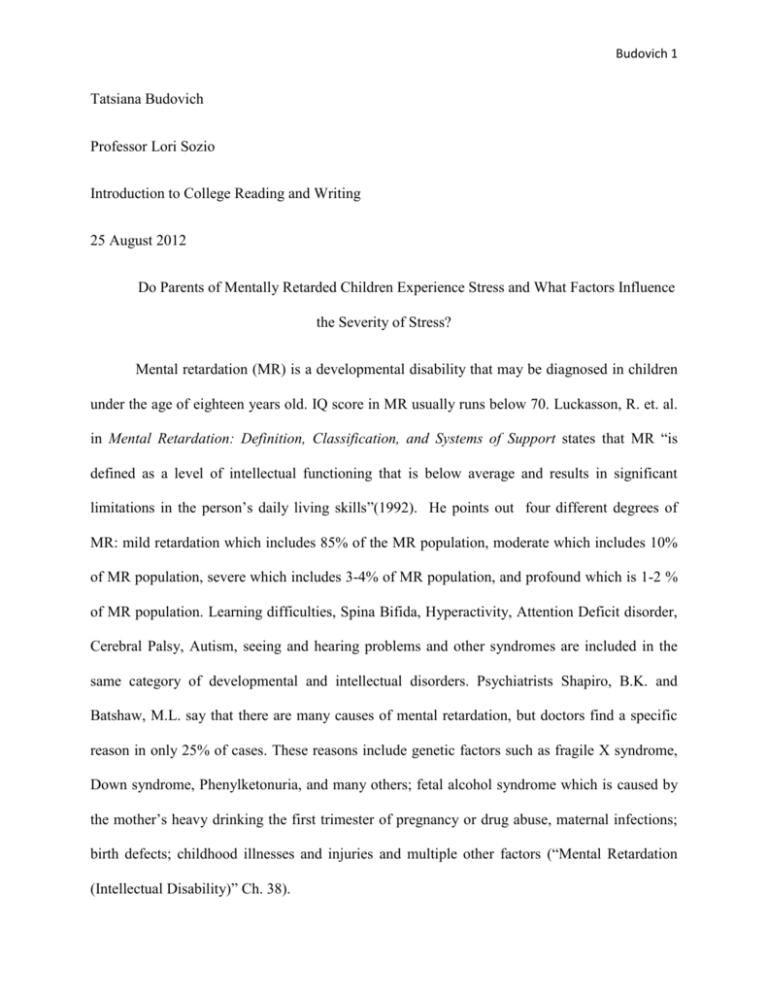
Budovich 1 Tatsiana Budovich Professor Lori Sozio Introduction to College Reading and Writing 25 August 2012 Do Parents of Mentally Retarded Children Experience Stress and What Factors Influence the Severity of Stress? Mental retardation (MR) is a developmental disability that may be diagnosed in children under the age of eighteen years old. IQ score in MR usually runs below 70. Luckasson, R. et. al. in Mental Retardation: Definition, Classification, and Systems of Support states that MR “is defined as a level of intellectual functioning that is below average and results in significant limitations in the person’s daily living skills”(1992). He points out four different degrees of MR: mild retardation which includes 85% of the MR population, moderate which includes 10% of MR population, severe which includes 3-4% of MR population, and profound which is 1-2 % of MR population. Learning difficulties, Spina Bifida, Hyperactivity, Attention Deficit disorder, Cerebral Palsy, Autism, seeing and hearing problems and other syndromes are included in the same category of developmental and intellectual disorders. Psychiatrists Shapiro, B.K. and Batshaw, M.L. say that there are many causes of mental retardation, but doctors find a specific reason in only 25% of cases. These reasons include genetic factors such as fragile X syndrome, Down syndrome, Phenylketonuria, and many others; fetal alcohol syndrome which is caused by the mother’s heavy drinking the first trimester of pregnancy or drug abuse, maternal infections; birth defects; childhood illnesses and injuries and multiple other factors (“Mental Retardation (Intellectual Disability)” Ch. 38). Budovich 2 Raising a child with a chronic disease or disability requires emotional strength and multiple medical, caregiving, educational and financial responsibilities. RN Lucy Boyd, who devotes her life to MR children, claims that parents of such children commonly experience guilt, sorrow, and rejection; all these feelings can harm the parents’ emotional health. They are shocked, embarrassed or ashamed by the mental disability of their child (“Problems Faced by Parents of Challenged Children”). Multiple studies focusing on the impact of disability on caregivers of MR children were conducted in order to help parents find successful strategies to handle their family situation. These studies show that families experience enormous physical and emotional burden and the level of the parental stress depends on the level of child’s mental retardation, gender of the parents, age of the child and parents, amount of the MR children in the family, and level of income. Pshychiatrist Heller, T. et. al. (1997) mentions that tremendous amount of stress chronically affects parental lives (“Maternal and Paternal Caregiving of Persons with Mental Retardation Across the Life Span” 407). It was also confirmed by a European cross-sectional survey conducted by Parkes J. et.al, whose goal was to define the stress level in the parents of children with Cerebral Palsy. A survey was directed through the parents of 818 children aged 8 to 12 years from nine regions in Europe. 94% respondents were mothers, and 26% of them reported very high stress levels. The parents of children with communication impairment had higher odds for very high stress (odds ratio [OR] 1.9 out of confidence interval [CI] 1.2-3.0) than those whose children had no such impairment. The parents of children with moderate or severe pain had higher odds for very high stress (1.7 out of 1.1-2.4 and 2.5 out of 1.5-4.3) than those whose child had no pain. The parents of children with an intellectual impairment had higher odds for very high stress (1.8 out of 1.2-2.9) than those whose children had none. The research Budovich 3 showed that parents of children with communication difficulties, intellectual impairment, or pain are at very high risk of stress. The level of psychosocial, physical, educational and financial problems faced by the parents of MR children is linked with the level of retardation of such children. Psychologists Shambhu Upadhyay and Anju Singh in 2009 contributed a study that compared the level of needs among parents of mildly and moderately retarded children. They found that families with moderately retarded children have more problems because they “were facing more risk in marital life which arose due to conflicts between wife and husband . . . blaming each other for giving birth to such a child, or for fear of giving birth to another such child . . .” (“The Impact of Level of Mental Retardation of Children” 107). Hence, parents of moderately retarded children reported more psychological problems because they worry about the child’s future and feel sad or depressed because they might face adverse rejection or neglect from the other family members. They also reported multiple physical problems which appeared because their moderately retarded child had poor cognitive ability which made the child completely dependent on parent’s care. Parents complained that they have difficult to get admission for their children in care centers or other educational institutes. The parents of moderately retarded children spend more of their income in caring and extra time in parenting of their children as opposed to parents of mildly retarded children. In addition, the level of parental stress depends on the gender of the parent. It was confirmed by psychologists Upadhyaya, G.R and Havalappanavar, N.B. who in 2008 conducted a research Stress in Parents of the Mentally Challenged which discovered that in three areas of stress such as care, emotional and social, mothers report higher levels of stress in comparison to Budovich 4 fathers, and both fathers and mothers report equal levels of stress in the area of financial stress. The possible reason for this difference could be that mothers spent more time without additional help and were limited in time for leisure activity. Higher level of stress in this study was also associated with lower age of mentally challenged child, lower age of parents, lower income of the parents and more than one MR child in the family. The study also points out that the level of parents’ education doesn’t make any difference to the perceived stress and burden (53-59). In conclusion, living with and caring for the person with MR is very stressful. Parents of such children experience enormous physical and emotional burdens. Multiple studies confirmed that the level of retardation of the child is crucial in relation to the needs of their caregivers. Among the parents, mothers perceive more emotional and social stress and burdens in caring for their disabled children than fathers do. All these findings lead to the fact that parents of such children need as much support from authorized institutions and from government as possible in order to help fight the stress and raise MR children. Even if MR counts as an incurable disease, parents of such children can do a lot of things for their kids. Parents can help reveal and develop talents of their kids; they can also give their children love which is the most important thing in our life. It is more than schools, doctors, any professionals or any institutions can do. Budovich 5 Work Cited Boyd, Lucy “Problems Faced by Parents of Challenged Children.” LifeStong.com, 15 Mar. 2011. Web. 4 Aug. 2012. Heller, T., Hsieh, K., and Rowitz, L. “Maternal and Paternal Caregiving of Persons with Mental Retardation Across the Life Span”. Family relations. 1997, 46(4): 407-415. Print. Luckasson,R., Coulter, D.L., Polloway, E.A., Reiss, S., et al, “Mental Retardation: Definition, Classification, and Systems of support”. American Association on Mental Retardation. Washington. DC. 1992. Print. Parkes, J.; Caravale, B. ; Marcelli, M. ; Franco F. ; Colver A. “Parenting stress and children with cerebral palsy: a European cross-sectional survey” Developmental Medicine & Child Neurology. 2011 Sep; 53(9): 815-21. Print. Shapiro, B.K.; Batshaw, M.L.” Mental retardation (Intellectual Disability)”. In: Kliegman RM, Behrman RE, Jenson HB, Stanton BF, eds. Nelson Textbook of Pediatrics. 18th ed. Philadelphia, Pa: Saunders Elsevier; 2007, chap. 38. NYTimes.com. Web. 4 Aug. 2012. Upadhyaya, G.R., Havalappanavar,N. B. “Stress in Parents of the Mentally Challenged.” Journal of the Indian Academy of Applied Psychology, April 2008, Vol. 34, Special Issue, 53-59, Web. 4 Aug. 2012. Upadhyay, Shambhu, Singh, Anju. “Psychosocial Problems and Needs of Parents in Caring Mentally Retarded Children: The Impact of Level of Mental Retardation of Children.” Budovich 6 Indian Journal Social Science Researches, March 2009, Vol.6, 103-112, Nu.1, Web. 10 Aug. 2012.
